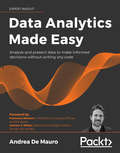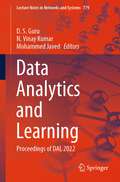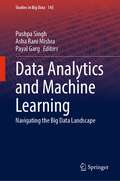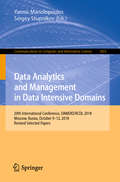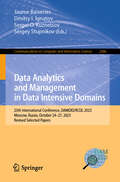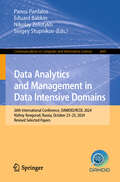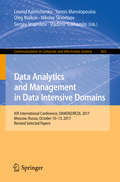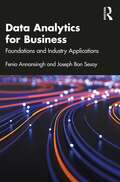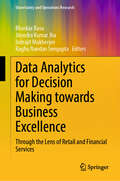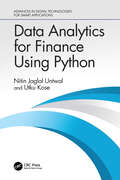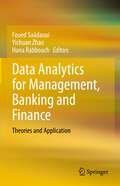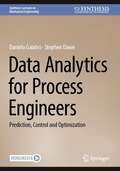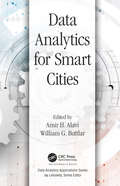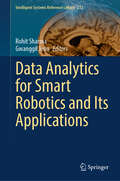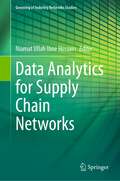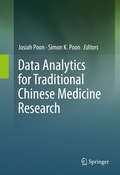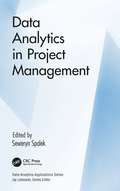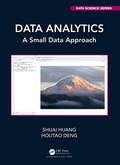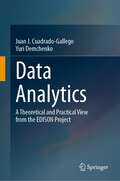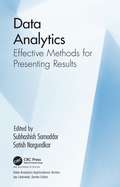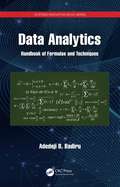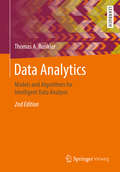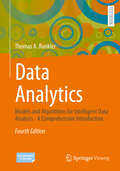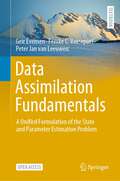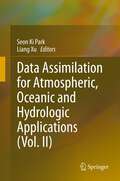- Table View
- List View
Data Analytics Made Easy: Use machine learning and data storytelling in your work without writing any code
by Andrea De Mauro Francesco Marzoni Andrew J. WalterMake informed decisions using data analytics, machine learning, and data visualizationsKey FeaturesTake raw data and transform it to add value to your organizationLearn the art of telling stories with your data to engage with your audienceApply machine learning algorithms to your data with a few clicks of a buttonBook DescriptionData analytics has become a necessity in modern business, and skills such as data visualization, machine learning, and digital storytelling are now essential in every field. If you want to make sense of your data and add value with informed decisions, this is the book for you. Data Analytics Made Easy is an accessible guide to help you start analyzing data and quickly apply these skills to your work. It focuses on how to generate insights from your data at the click of a few buttons, using the popular tools KNIME and Microsoft Power BI. The book introduces the concepts of data analytics and shows you how to get your data ready and apply machine learning algorithms. Implement a complete predictive analytics solution with KNIME and assess its level of accuracy. Create impressive visualizations with Microsoft Power BI and learn the greatest secret in successful analytics – how to tell a story with your data. You'll connect the dots on the various stages of the data-to-insights process and gain an overview of alternative tools, including Tableau and H20 Driverless AI. By the end of this book, you will have learned how to implement machine learning algorithms and sell the results to your customers without writing a line of code.What you will learnUnderstand the potential of data and its impact on any businessInfluence business decisions with effective data storytelling when delivering insightsUse KNIME to import, clean, transform, combine data feeds, and automate recurring workflowsLearn the basics of machine learning and AutoML to add value to your organizationBuild, test, and validate simple supervised and unsupervised machine learning models with KNIMEUse Power BI and Tableau to build professional-looking and business-centric visuals and dashboardsWho this book is forWhether you are working with data experts or want to find insights in your business' data, you'll find this book an effective way to add analytics to your skill stack.No previous math, statistics, or computer science knowledge is required.
Data Analytics and Learning: Proceedings of DAL 2022 (Lecture Notes in Networks and Systems #779)
by D. S. Guru N. Vinay Kumar Mohammed JavedThis book presents new theories and working models in the areas of data analytics and learning. The papers included in this volume were presented at the second International Conference on Data Analytics and Learning (DAL 2022), which was organized by the Department of Computer Science & Engineering, Alva’s Institute of Engineering & Technology, Moodbidri, Mangalore, Karnataka, India in association with the Department of Studies in Computer Science, University of Mysore, Mysuru, Karnataka, India. The areas covered include pattern recognition, image processing, deep learning, computer vision, data analytics, machine learning, artificial intelligence, and intelligent systems.
Data Analytics and Machine Learning: Navigating the Big Data Landscape (Studies in Big Data #145)
by Pushpa Singh Asha Rani Mishra Payal GargThis book presents an in-depth analysis of successful data-driven initiatives, highlighting how organizations have leveraged data to drive decision-making processes, optimize operations, and achieve remarkable outcomes. Through case studies, readers gain valuable insights and learn practical strategies for implementing data analytics, big data, and machine learning solutions in their own organizations. The book discusses the transformative power of data analytics and big data in various industries and sectors and how machine learning applications have revolutionized exploration by enabling advanced data analysis techniques for mapping, geospatial analysis, and environmental monitoring, enhancing our understanding of the world and its dynamic processes. This book explores how big data explosion, the power of analytics and machine learning revolution can bring new prospects and opportunities in the dynamic and data-rich landscape. It highlights the future research directions in data analytics, big data, and machine learning that explores the emerging trends, challenges, and opportunities in these fields by covering interdisciplinary approaches such as handling and analyzing real-time and streaming data.
Data Analytics and Management in Data Intensive Domains: 20th International Conference, DAMDID/RCDL 2018, Moscow, Russia, October 9–12, 2018, Revised Selected Papers (Communications in Computer and Information Science #1003)
by Yannis Manolopoulos Sergey StupnikovThis book constitutes the refereed proceedings of the 20th International Conference on Data Analytics and Management in Data Intensive Domains, DAMDID/RCDL 2018, held in Moscow, Russia, in October 2018.The 9 revised full papers presented together with three invited papers were carefully reviewed and selected from 54 submissions. The papers are organized in the following topical sections: FAIR data infrastructures, interoperability and reuse; knowledge representation; data models; data analysis in astronomy; text search and processing; distributed computing; information extraction from text.
Data Analytics and Management in Data Intensive Domains: 25th International Conference, DAMDID/RCDL 2023, Moscow, Russia, October 24–27, 2023, Revised Selected Papers (Communications in Computer and Information Science #2086)
by Dmitry I. Ignatov Jaume Baixeries Sergei O. Kuznetsov Sergey StupnikovThis book constitutes the post-conference proceedings of the 25th International Conference on Data Analytics and Management in Data Intensive Domains, DAMDID/RCDL 2023, held in Moscow, Russia, during 24-27 October 2023. The 21 papers presented here were carefully reviewed and selected from 75 submissions. These papers are organized in the following topical sections: Data Models and Knowledge Graphs; Databases in Data Intensive Domains; Machine learning methods and applications; Data Analysis in Astronomy & Information extraction from text. Papers from keynote talks have also been included in this book.
Data Analytics and Management in Data Intensive Domains: 26th International Conference, DAMDID/RCDL 2024, Nizhny Novgorod, Russia, October 23–25, 2024, Revised Selected Papers (Communications in Computer and Information Science #2641)
by Eduard Babkin Panos Pardalos Sergey Stupnikov Nikolay ZolotykhThis book includes the revised selected papers from the 26th International Conference on Data Analytics and Management in Data Intensive Domains, DAMDID/RCDL 2024, held in Nizhny Novgorod, Russia, during October 22-25, 2024. The 15 full papers and 5 short papers presented in this volume were carefully reviewed and selected from 71 submissions. They focus on Conceptual Modeling and Ontologies; Generative and Transformer-Based Models; Machine Learning Methods and Applications and Statistical Methods and Applications.
Data Analytics and Management in Data Intensive Domains: XIX International Conference, DAMDID/RCDL 2017, Moscow, Russia, October 10–13, 2017, Revised Selected Papers (Communications in Computer and Information Science #822)
by Yannis Manolopoulos Leonid Kalinichenko Oleg Malkov Nikolay Skvortsov Sergey Stupnikov Vladimir SukhomlinThis book constitutes the refereed proceedings of the 19th International Conference on Data Analytics and Management in Data Intensive Domains, DAMDID/RCDL 2017, held in Moscow, Russia, in October 2017.The 16 revised full papers presented together with three invited papers were carefully reviewed and selected from 75 submissions. The papers are organized in the following topical sections: data analytics; next generation genomic sequencing: challenges and solutions; novel approaches to analyzing and classifying of various astronomical entities and events; ontology population in data intensive domains; heterogeneous data integration issues; data curation and data provenance support; and temporal summaries generation.
Data Analytics for Business: Foundations and Industry Applications
by Fenio Annansingh Joseph Bon SesayData analytics underpin our modern data-driven economy. This textbook explains the relevance of data analytics at the firm and industry levels, tracing the evolution and key components of the field, and showing how data analytics insights can be leveraged for business results. The first section of the text covers key topics such as data analytics tools, data mining, business intelligence, customer relationship management, and cybersecurity. The chapters then take an industry focus, exploring how data analytics can be used in particular settings to strengthen business decision-making. A range of sectors are examined, including financial services, accounting, marketing, sport, health care, retail, transport, and education. With industry case studies, clear definitions of terminology, and no background knowledge required, this text supports students in gaining a solid understanding of data analytics and its practical applications. PowerPoint slides, a test bank of questions, and an instructor’s manual are also provided as online supplements. This will be a valuable text for undergraduate level courses in data analytics, data mining, business intelligence, and related areas.
Data Analytics for Decision Making towards Business Excellence: Through the Lens of Retail and Financial Services (Uncertainty and Operations Research)
by Raghu Nandan Sengupta Bhaskar Basu Jitendra Kumar Jha Indrajit MukherjeeThis edited volume collates discussions on latest challenges, opportunities, trends and practices applicable to two major business sectors -- retail and financial services -- and chapters are segregated accordingly. It explores how these sectors are increasingly becoming data-intensive, and how ways of handling, manipulating, exploiting and evaluating data continues to change in this era of big data. Part A of the book looks into better understanding of marketing metrics/ strategy/ theory and practice using retail analytics. Topics being explored are: inventory, assortment, and promotion effectiveness; pricing strategies; brand/category switching and customer loyalty; customer profitability; customer engagement; cross-buying and up-buying; synergistic effects of online and offline channels and retail innovations; effectiveness of different type of distribution channels; customer experience; service excellence/failure/recovery; digitalizationin retailing; consumer behaviour and marketing in omni-channel retail environments. In Part B, topics of relevance include financial aspects of data analytics such as: behavioral data finance; Big data and credit risk; data analytics and financial econometrics; financial sentiment and news analysis; information and evidence in digital age; policy-making mechanisms and modelling approaches; stock market manipulation detection; stock market trading strategies using data analytics; high frequency/ algorithmic trading with AI; financial forecasting including interest rate/ old price/ crude oil/ macroeconomic variables/ FOREX/ cryptocurrency price; deep learning for finance and insurance applications. The book covers diverse and advanced concepts with practical examples to supplement and complement varied topics of interest within the domain. Thus students, researchers, and practitioners will undoubtedly find novel and new ideas for data analytics in the realm of two critical domain areas: retail and financial services.
Data Analytics for Finance Using Python (Advances in Digital Technologies for Smart Applications)
by Nitin Jaglal Untwal Utku KoseUnlock the power of data analytics in finance with this comprehensive guide. Data Analytics for Finance Using Python is your key to unlocking the secrets of the financial markets.In this book, you’ll discover how to harness the latest data analytics techniques, including machine learning and inferential statistics, to make informed investment decisions and drive business success. With a focus on practical application, this book takes you on a journey from the basics of data preprocessing and visualization to advanced modeling techniques for stock price prediction.Through real-world case studies and examples, you’ll learn how to: Uncover hidden patterns and trends in financial data Build predictive models that drive investment decisions Optimize portfolio performance using data-driven insights Stay ahead of the competition with cutting-edge data analytics techniques Whether you’re a finance professional seeking to enhance your data analytics skills or a researcher looking to advance the field of finance through data-driven insights, this book is an essential resource. Dive into the world of data analytics in finance and discover the power to make informed decisions, drive business success, and stay ahead of the curve.This book will be helpful for students, researchers, and users of machine learning and financial tools in the disciplines of commerce, management, and economics.
Data Analytics for Management, Banking and Finance: Theories and Application
by Yichuan Zhao Foued Saâdaoui Hana RabbouchThis book is a practical guide on the use of various data analytics and visualization techniques and tools in the banking and financial sectors. It focuses on how combining expertise from interdisciplinary areas, such as machine learning and business analytics, can bring forward a shared vision on the benefits of data science from the research point of view to the evaluation of policies. It highlights how data science is reshaping the business sector. It includes examples of novel big data sources and some successful applications on the use of advanced machine learning, natural language processing, networks analysis, and time series analysis and forecasting, among others, in the banking and finance.It includes several case studies where innovative data science models is used to analyse, test or model some crucial phenomena in banking and finance. At the same time, the book is making an appeal for a further adoption of these novel applications in the field of economics and finance so that they can reach their full potential and support policy-makers and the related stakeholders in the transformational recovery of our societies.The book is for stakeholders involved in research and innovation in the banking and financial sectors, but also those in the fields of computing, IT and managerial information systems, helping through this new theory to better specify the new opportunities and challenges. The many real cases addressed in this book also provide a detailed guide allowing the reader to realize the latest methodological discoveries and the use of the different Machine Learning approaches (supervised, unsupervised, reinforcement, deep, etc.) and to learn how to use and evaluate performance of new data science tools and frameworks
Data Analytics for Process Engineers: Prediction, Control and Optimization (Synthesis Lectures on Mechanical Engineering)
by Daniela Galatro Stephen DaweThis book provides an industry-oriented data analytics approach for process engineers, including data acquisition methods and sources, exploratory data analysis and sensitivity analysis, data-based modelling for prediction, data-based modelling for monitoring and control, and data-based optimization of processes. While many of the current data analytics books target business-related problems, the rationale for this book is a specific need to understand and select applicable data analytics approaches pragmatically to analyze process engineering–related problems; this tailored solution for engineers gets amalgamated with governing equations, and in several cases, with the physical understanding of the phenomenon being analyzed. We also consider this book strategically conceived to help map Education 4.0 with Industry 4.0 since it can support undergraduate and graduate students to gain valuable and applicable data analytics stills that can be further used in their workplace. Moreover, it can be used as a reference book for professionals, a quick reference to data analytics tools that can facilitate and/or optimize their process engineering tasks.
Data Analytics for Smart Cities (Data Analytics Applications)
by William G. Buttlar Amir AlaviThe development of smart cities is one of the most important challenges over the next few decades. Governments and companies are leveraging billions of dollars in public and private funds for smart cities. Next generation smart cities are heavily dependent on distributed smart sensing systems and devices to monitor the urban infrastructure. The smart sensor networks serve as autonomous intelligent nodes to measure a variety of physical or environmental parameters. They should react in time, establish automated control, and collect information for intelligent decision-making. In this context, one of the major tasks is to develop advanced frameworks for the interpretation of the huge amount of information provided by the emerging testing and monitoring systems. Data Analytics for Smart Cities brings together some of the most exciting new developments in the area of integrating advanced data analytics systems into smart cities along with complementary technological paradigms such as cloud computing and Internet of Things (IoT). The book serves as a reference for researchers and engineers in domains of advanced computation, optimization, and data mining for smart civil infrastructure condition assessment, dynamic visualization, intelligent transportation systems (ITS), cyber-physical systems, and smart construction technologies. The chapters are presented in a hands-on manner to facilitate researchers in tackling applications. Arguably, data analytics technologies play a key role in tackling the challenge of creating smart cities. Data analytics applications involve collecting, integrating, and preparing time- and space-dependent data produced by sensors, complex engineered systems, and physical assets, followed by developing and testing analytical models to verify the accuracy of results. This book covers this multidisciplinary field and examines multiple paradigms such as machine learning, pattern recognition, statistics, intelligent databases, knowledge acquisition, data visualization, high performance computing, and expert systems. The book explores new territory by discussing the cutting-edge concept of Big Data analytics for interpreting massive amounts of data in smart city applications.
Data Analytics for Smart Robotics and Its Applications (Intelligent Systems Reference Library #272)
by Rohit Sharma Gwanggil JeonBy offering a deep dive into the integration of robotics and IoT, this book provides actionable insights for developing autonomous systems that address complex real-world challenges in sectors such as healthcare, agriculture, education, manufacturing, and smart cities. It explores practical applications of the Internet of Robotic Things (IoRT), enabling readers to leverage its transformative potential to create smarter, more efficient environments. The book introduces a fresh perspective by combining the fields of robotics and IoT into a cohesive framework, underpinned by innovations in edge computing, cloud robotics, and Industry 4.0. Unlike traditional approaches, it emphasizes the convergence of these technologies to foster novel solutions for remote automation and data-driven intelligence. Covering topics like data management, machine learning, Hadoop, and IoRT applications, this book provides a comprehensive scope that balances theoretical foundations with real-world implementations. It is tailored for academic researchers, practitioners, and educators aiming to stay at the forefront of IoRT innovation and its practical deployment. With its unique approach and broad applicability, this book is an essential guide for exploring cutting-edge IoRT technologies, overcoming integration challenges, and inspiring the development of advanced systems that redefine how technology interacts with the physical world.
Data Analytics for Supply Chain Networks (Greening of Industry Networks Studies #11)
by Niamat Ullah Ibne HossainThe objective of the book is to adopt the application of data analytics to enhance the sustainability and resilience of the green supply chain networks. To demonstrate the applicability and usefulness of the method, the book adopts different data analytic models and approaches against the backdrop of case studies. In summary, this book attempts to address the question of methods, tools, and techniques that can be used to create resilient, anti-fragile, reliable, and invulnerable green supply chain networks.
Data Analytics for Traditional Chinese Medicine Research
by Josiah Poon Simon K. PoonThis contributed volume explores how data mining, machine learning, and similar statistical techniques can analyze the types of problems arising from Traditional Chinese Medicine (TCM) research. The book focuses on the study of clinical data and the analysis of herbal data. Challenges addressed include diagnosis, prescription analysis, ingredient discoveries, network based mechanism deciphering, pattern-activity relationships, and medical informatics. Each author demonstrates how they made use of machine learning, data mining, statistics and other analytic techniques to resolve their research challenges, how successful if these techniques were applied, any insight noted and how these insights define the most appropriate future work to be carried out. Readers are given an opportunity to understand the complexity of diagnosis and treatment decision, the difficulty of modeling of efficacy in terms of herbs, the identification of constituent compounds in an herb, the relationship between these compounds and biological outcome so that evidence-based predictions can be made. Drawing on a wide range of experienced contributors, Data Analytics for Traditional Chinese Medicine Research is a valuable reference for professionals and researchers working in health informatics and data mining. The techniques are also useful for biostatisticians and health practitioners interested in traditional medicine and data analytics.
Data Analytics in Project Management (Data Analytics Applications)
by Seweryn SpalekThis book aims to help the reader better understand the importance of data analysis in project management. Moreover, it provides guidance by showing tools, methods, techniques and lessons learned on how to better utilize the data gathered from the projects. First and foremost, insight into the bridge between data analytics and project management aids practitioners looking for ways to maximize the practical value of data procured. The book equips organizations with the know-how necessary to adapt to a changing workplace dynamic through key lessons learned from past ventures. The book’s integrated approach to investigating both fields enhances the value of research findings.
Data Analytics: A Small Data Approach (Chapman & Hall/CRC Data Science Series)
by Shuai Huang Houtao DengData Analytics: A Small Data Approach is suitable for an introductory data analytics course to help students understand some main statistical learning models. It has many small datasets to guide students to work out pencil solutions of the models and then compare with results obtained from established R packages. Also, as data science practice is a process that should be told as a story, in this book there are many course materials about exploratory data analysis, residual analysis, and flowcharts to develop and validate models and data pipelines. The main models covered in this book include linear regression, logistic regression, tree models and random forests, ensemble learning, sparse learning, principal component analysis, kernel methods including the support vector machine and kernel regression, and deep learning. Each chapter introduces two or three techniques. For each technique, the book highlights the intuition and rationale first, then shows how mathematics is used to articulate the intuition and formulate the learning problem. R is used to implement the techniques on both simulated and real-world dataset. Python code is also available at the book’s website: http://dataanalyticsbook.info.
Data Analytics: A Theoretical and Practical View from the EDISON Project
by Yuri Demchenko Juan J. Cuadrado-GallegoBuilding upon the knowledge introduced in The Data Science Framework, this book provides a comprehensive and detailed examination of each aspect of Data Analytics, both from a theoretical and practical standpoint. The book explains representative algorithms associated with different techniques, from their theoretical foundations to their implementation and use with software tools.Designed as a textbook for a Data Analytics Fundamentals course, it is divided into seven chapters to correspond with 16 weeks of lessons, including both theoretical and practical exercises. Each chapter is dedicated to a lesson, allowing readers to dive deep into each topic with detailed explanations and examples. Readers will learn the theoretical concepts and then immediately apply them to practical exercises to reinforce their knowledge. And in the lab sessions, readers will learn the ins and outs of the R environment and data science methodology to solve exercises with the R language. With detailed solutions provided for all examples and exercises, readers can use this book to study and master data analytics on their own. Whether you're a student, professional, or simply curious about data analytics, this book is a must-have for anyone looking to expand their knowledge in this exciting field.
Data Analytics: Effective Methods for Presenting Results (Data Analytics Applications)
by Subhashish Samaddar Satish NargundkarIf you are a manager who receives the results of any data analyst’s work to help with your decision-making, this book is for you. Anyone playing a role in the field of analytics can benefit from this book as well. In the two decades the editors of this book spent teaching and consulting in the field of analytics, they noticed a critical shortcoming in the communication abilities of many analytics professionals. Specifically, analysts have difficulty in articulating in business terms what their analyses showed and what actionable recommendations were made. When analysts made presentations, they tended to lapse into the technicalities of mathematical procedures, rather than focusing on the strategic and tactical impact and meaning of their work. As analytics has become more mainstream and widespread in organizations, this problem has grown more acute. Data Analytics: Effective Methods for Presenting Results tackles this issue. The editors have used their experience as presenters and audience members who have become lost during presentation. Over the years, they experimented with different ways of presenting analytics work to make a more compelling case to top managers. They have discovered tried and true methods for improving presentations, which they share. The book also presents insights from other analysts and managers who share their own experiences. It is truly a collection of experiences and insight from academics and professionals involved with analytics. The book is not a primer on how to draw the most beautiful charts and graphs or about how to perform any specific kind of analysis. Rather, it shares the experiences of professionals in various industries about how they present their analytics results effectively. They tell their stories on how to win over audiences. The book spans multiple functional areas within a business, and in some cases, it discusses how to adapt presentations to the needs of audiences at different levels of management.
Data Analytics: Handbook of Formulas and Techniques (Systems Innovation Book Series)
by Adedeji B. BadiruGood data analytics is the basis for effective decisions. Whoever has the data, has the ability to extract information promptly and effectively to make pertinent decisions. The premise of this handbook is to empower users and tool developers with the appropriate collection of formulas and techniques for data analytics and to serve as a quick reference to keep pertinent formulas within fingertip reach of readers. This handbook includes formulas that will appeal to mathematically inclined readers. It discusses how to use data analytics to improve decision-making and is ideal for those new to using data analytics to show how to expand their usage horizon. It provides quantitative techniques for modeling pandemics, such as COVID-19. It also adds to the suite of mathematical tools for emerging technical areas. This handbook is a handy reference for researchers, practitioners, educators, and students in areas such as industrial engineering, production engineering, project management, civil engineering, mechanical engineering, technology management, and business management worldwide.
Data Analytics: Models and Algorithms for Intelligent Data Analysis
by Thomas A. RunklerThis book is a comprehensive introduction to the methods and algorithms of modern data analytics. It provides a sound mathematical basis, discusses advantages and drawbacks of different approaches, and enables the reader to design and implement data analytics solutions for real-world applications. This book has been used for more than ten years in the Data Mining course at the Technical University of Munich. Much of the content is based on the results of industrial research and development projects at Siemens.
Data Analytics: Models and Algorithms for Intelligent Data Analysis - A Comprehensive Introduction
by Thomas A. RunklerThis book is a comprehensive introduction to the methods and algorithms of modern data analytics. It provides a sound mathematical basis, discusses advantages and drawbacks of different approaches, and enables the reader to design and implement data analytics solutions for real-world applications. The new edition integrates themes such as Word Embeddings, Transformer Models, and generative AI among the contents and offers new exercises in addition. This book has been used for more than ten years in the Data Mining course at the Technical University of Munich. Much of the content is based on the results of industrial research and development projects at Siemens.
Data Assimilation Fundamentals: A Unified Formulation of the State and Parameter Estimation Problem (Springer Textbooks in Earth Sciences, Geography and Environment)
by Geir Evensen Femke C. Vossepoel Peter Jan van LeeuwenThis open-access textbook's significant contribution is the unified derivation of data-assimilation techniques from a common fundamental and optimal starting point, namely Bayes' theorem. Unique for this book is the "top-down" derivation of the assimilation methods. It starts from Bayes theorem and gradually introduces the assumptions and approximations needed to arrive at today's popular data-assimilation methods. This strategy is the opposite of most textbooks and reviews on data assimilation that typically take a bottom-up approach to derive a particular assimilation method. E.g., the derivation of the Kalman Filter from control theory and the derivation of the ensemble Kalman Filter as a low-rank approximation of the standard Kalman Filter. The bottom-up approach derives the assimilation methods from different mathematical principles, making it difficult to compare them. Thus, it is unclear which assumptions are made to derive an assimilation method and sometimes even which problem it aspires to solve. The book's top-down approach allows categorizing data-assimilation methods based on the approximations used. This approach enables the user to choose the most suitable method for a particular problem or application. Have you ever wondered about the difference between the ensemble 4DVar and the "ensemble randomized likelihood" (EnRML) methods? Do you know the differences between the ensemble smoother and the ensemble-Kalman smoother? Would you like to understand how a particle flow is related to a particle filter? In this book, we will provide clear answers to several such questions. The book provides the basis for an advanced course in data assimilation. It focuses on the unified derivation of the methods and illustrates their properties on multiple examples. It is suitable for graduate students, post-docs, scientists, and practitioners working in data assimilation.
Data Assimilation for Atmospheric, Oceanic and Hydrologic Applications (Vol. II)
by Liang Xu Seon Ki ParkThis book contains the most recent progress in data assimilation in meteorology, oceanography and hydrology including land surface. It spans both theoretical and applicative aspects with various methodologies such as variational, Kalman filter, ensemble, Monte Carlo and artificial intelligence methods. Besides data assimilation, other important topics are also covered including targeting observation, sensitivity analysis, and parameter estimation. The book will be useful to individual researchers as well as graduate students for a reference in the field of data assimilation.
